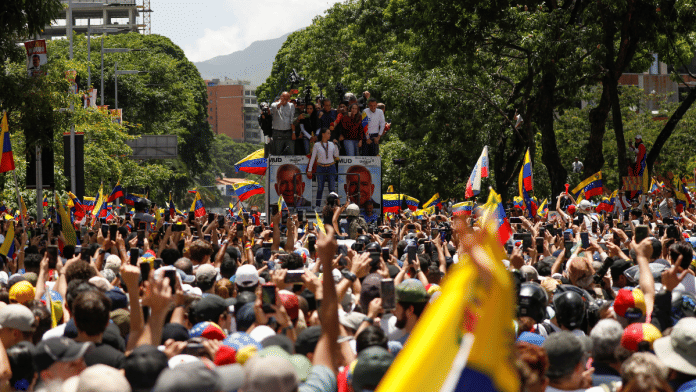Thank you dear subscribers, we are overwhelmed with your response.
Your Turn is a unique section from ThePrint featuring points of view from its subscribers. If you are a subscriber, have a point of view, please send it to us. If not, do subscribe here: https://theprint.in/subscribe/
Every October, the world pauses for a moment of moral theatre — the announcement of the Nobel Peace Prize. Once a symbol of humanity’s higher calling, it has now become a mirror reflecting political convenience. In 2025, that mirror cracked again.
This year, the Nobel Peace Prize went to María Corina Machado, the Venezuelan opposition leader lauded for “promoting democracy and human rights.” On the surface, she fits the part — a brave woman confronting dictatorship. But dig a little deeper and the selection reveals the political leanings of the Nobel Committee itself. In a world tormented by genocide, famine, and occupation, it chose not the voices who stand by the powerless, but one aligned with the ideological priorities of Washington and Brussels.
The Prize as Propaganda
The Nobel Peace Prize has long drifted from its founding intent, namely to reward genuine peace-making, toward something closer to moral endorsement for Western allies. Henry Kissinger’s 1973 award for orchestrating destruction in Vietnam was the first great farce. Barack Obama’s 2009 prize for “hope” – even as drone wars intensified – was the second. Each time, the message was the same: peace, when defined by empire, is a performance, not a principle.
Machado’s award continues the pattern. Her politics are openly aligned with the U.S. right wing; she supported Donald Trump’s campaign to recognize Jerusalem as Israel’s capital and to sanction Venezuela into submission. Her Nobel is not for ending war but for endorsing a certain kind of opposition — one that fits Western interventionist narratives. This is the Nobel Committee’s enduring paradox: it celebrates “peace” only when it emerges from within acceptable ideological boundaries.
If the Committee truly sought to reward moral courage, it could have looked elsewhere — to those who risk their lives not for office or prestige, but for the sanctity of truth and human dignity.
The question then surfaces: Who Truly Deserved It? Think of Desmond Tutu, who thundered against apartheid’s cruelty and later denounced global injustice with the same fervour. Nelson Mandela, who emerged from prison preaching forgiveness rather than vengeance. Martin Luther King Jr., who transformed faith into resistance and confronted America’s violence from within. These were peacemakers forged in suffering. They refused to be strategists of self-interest.
Today, there are others equally worthy, but the Nobel Committee has lost it core goalmouth, and this is far less celebrated.
Francesca Albanese, the UN Special Rapporteur for the Occupied Palestinian Territories, who has documented Israeli war crimes and dared to call them by name even as powerful nations smear her. She embodies integrity – a voice of law and conscience amid global cowardice. To name just a few far better options that the one that made the cut at the end.
- The journalists of Gaza, who continue reporting through bombardment, documenting every atrocity at unimaginable personal risk.
- The humanitarian flotillas, braving blockades to bring food and medicine to starving civilians.
- Grassroots activists in Sudan, Congo, and Myanmar, who practice peace without medals, facing militias and hunger with little more than courage.
These are the world’s unacknowledged, yet true, laureates. Their lives are lived as resistance — without applause, without ceremony, without Oslo.
When the Nobel Committee rewards figures like Machado, it is not only making a choice; it is choosing who not to see. The prize devolves into the politics of silence. It did not choose a Palestinian nurse who has lost both her legs and continues to treat the wounded. It did not choose a Yemeni doctor feeding children from hospital scraps. It did not choose the women of Iran who risk execution for walking unveiled.
Instead, the Nobel often sanctifies establishment-friendly dissent, noble enough to sound moral, safe enough not to threaten empire. That silence is political. It draws the moral map of the world: whose suffering matters, whose resistance counts, and whose peace is allowed to exist. More brusquely put, if the Nobel Prize were to rediscover its lost conscience, it would need to reimagine peace not as the absence of war, but as the presence of justice. Reclaiming the Meaning of Peace
That, in turn, would oblige the Nobel Committee to
- Prioritising those without lobbies or governments behind them.
- Recognising collective struggles, movements of women, refugees, students, and indigenous communities who defend peace through persistence, not power.
- Disqualifying any leader whose hands are stained with civilian blood, no matter how eloquently they speak at summits.
And perhaps, in some years, giving the award anonymously to protect those who live under siege yet dare to speak. Peace is not a bland, or an intangible press release; it is moral courage lived out daily, often invisibly.
The Nobel Peace Prize, as it stands today, helps define what the powerful call “good resistance”. It delegitimises everything else bar the cynical reality. Machado’s victory flatters Western policy in Latin America while Gaza lies in ruins, Yemen starves, and Africa bleeds in silence.
To the Committee, Francesca Albanese’s meticulous reporting is too “controversial,” too blunt in its truths. To millions worldwide, it is precisely what the Nobel Prize should stand for: unarmed courage in the face of overwhelming violence.
The true custodians of peace are not those who shake hands in palaces, but those who hold out food, medicine, and truth in the ruins.
Until the Nobel Committee learns that difference, its announcements will remain theatre- sheer ritual applause for a peace that never comes.
*Ranjan Solomon is a political commentator who writes on power, morality, and the politics of peace
These pieces are being published as they have been received – they have not been edited/fact-checked by ThePrint.


